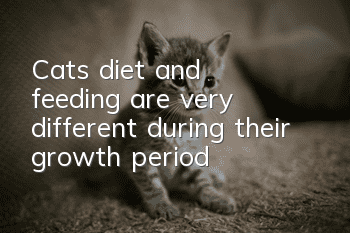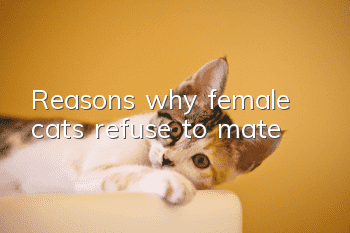Cats’ diet and feeding are very different during their growth period

If you want to feed your cat nutritiously and healthily, pet owners must understand some knowledge. For example, a cat's growth is divided into several stages, as well as the nutrients required at each stage. Especially during the kitten period, compared to the basis of the cat's life, if the kitten lacks nutrition during the kitten period, it will have a great impact on the cat's future health.
1. Attention should be paid to the diet of kittens
1. Balanced diet
A nutritious and balanced diet is very important for the healthy and lively growth of kittens. Its food must contain sufficient protein, fat, vitamins and minerals and these nutrients should be matched in certain proportions.
2. Special milk for newborns
(1) 4 to 5 times a day from three weeks to 2.5 months after birth. Dry cat food can be mixed with hot water and cat milk and then given to cats.
(2) 3 times a day from 2.5 months to 6 months after birth. Give dry cat food directly. From 6 months old to adult cats: 2 times a day.
Some cats will suffer from diarrhea if they consume milk, so milk specially designed for cats should be used.
3. Fixed feeding time
Give it regularly and correctly at a fixed time and place so that the cat can develop good habits. Do not allow your cat to have food readily available as this will overburden his digestive system.
4. Choose fixed-point feeding
Feed food in a quiet place away from the litter box, otherwise your cat may refuse to eat. Leave the food on for a while (15 to 30 minutes) and then remove the bowl until the next feeding time.
5. Consider the portion of food
The initial dose given is as big as the cat’s head. Later, you can change it according to different life stages. Kitten food must contain sufficient protein, fat, vitamins and minerals and these nutrients should be matched in certain proportions.
Kitten cat food is specially prepared for kittens and can meet their special nutritional needs.
2. Diet precautions for adult cats
1. Kittens transform into adult cats
Cats can begin to be fed adult cat food when they are 8 to 9 months old. This gradual acclimation process should ideally take one week. This way the cat can fully adapt to adult cat food when it reaches adulthood.
2. Male cats eat more food
Male cats eat more and grow faster than female cats. And they weigh more than female cats as adults. Different breeds of cats have different food intakes depending on their body size, activity level and physical condition.
3. Cats eat the right amount
Most cats can control how much they eat. If the food is nutritionally balanced, the cat willWill eat in moderation. Unless your cat is obese, there is no need to limit his food intake.
Do not feed your cat more than two eggs a week.
3. Diet precautions for elderly cats
1. Reduce food portions
When cats reach old age, their activity level will decrease and their dosage should be reduced to prevent obesity. And some cats’ digestive system function declines after they reach old age, and the cats may not be able to absorb all the nutrients in the food and become thinner.
Obesity can make it difficult for cats to groom themselves and lead to skin diseases.
2. Old cats should eat less and more meals
Domestic cats often consume more calories than they exercise, especially old cats that don’t like to move. If the cat is too fat, it will not like to move, which will cause a vicious cycle of obesity. To avoid obesity in older cats, you can reduce their caloric intake by 20% during adulthood.
If all the teeth are lost, food must be steamed before being given to the cat.
4. Pay attention to the diet of female cats during the breeding period
1. Strengthen nutritional supplements
The cat food should be changed to the amount specially designed for lactating and pregnant cats, and some vegetable stew should be added to supplement nutrition. Since the baby in the body is growing rapidly, the mother cat needs to eat more food than usual.
2. Double the amount of food
In the fifth or sixth week of lactation, the female cat needs three times as much food as before mating. During the last two weeks of the nine-week pregnancy, cats will eat twice as much food as usual. Your cat's food should be palatable so that he will eat enough to meet his needs.
3. Add calcium powder nutrition
Pregnant cats have special needs for nutrition. For example, pregnancy and breastfeeding will cause the cat's calcium to decrease significantly. At this time, calcium needs to be supplemented in time. The supplement method can be to crush nutritional tablets or calcium tablets and mix them with cat food until the kitten is weaned.
- Why do cats become less affectionate the more we keep them?
- What are the causes of dystocia in cats?
- What should I do if my cat is malnourished? How to improve it?
- How old is a cat in one month? How old is a cat in one month?
- Cat’s reaction after eating catnip
- What is the average lifespan of a cat? How old is a cat compared to a human?
- What to do if your cat has ear mites? Ear mites are contagious
- Why do cats like to poop with their owners?
- What causes patches of hair loss on kittens?
- Cat pregnancy precautions



